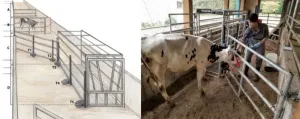(Press-News.org) Previously undescribed human gut bacteria that aid in the digestion of plant cellulose are scarce in urban societies but abundant in ancient and hunter-gatherer microbiomes, according to a new study. The findings provide insight into the poorly understood cellulosome-producing bacteria that inhabit the human gut and their response to modern urban diets and lifestyles. Like all mammals, humans rely on the gut microbiome to digest cellulose – the main component of plant fiber and a common element in diets that include plant-based material. Fermentation of dietary fiber via cellulosome-producing bacterial species transforms these indigestible compounds into short-chain fatty acids that play a role in host health, including preventing colon cancer and regulating blood sugar. Dietary fiber is also beneficial to gut microbiome stability and richness. However, modern industrialized diets, which are dominated by processed foods, are severely lacking in plant fiber, and evidence for cellulose degradation and fermentation in the human gut is scarce. Fundamental questions regarding the cellulose-degrading bacteria that inhabit the human gut and their adaptability to host lifestyle and diet remain. Sarah Moraïs and colleagues searched for key cellulosome genes in 92,143 human metagenome-assembled genomes and discovered three distinct, previously undescribed cellulosome-producing ruminococcal bacteria species that inhabit the human gut: Ruminococcus hominiciens, R. primaciens, and R. ruminiciens. Evolutionary analysis suggests that these bacteria may have originated in the ruminant gut and evolved to adapt to the human gut through gene acquisition from other microbial species. The prevalence of these species also exhibited notable variation among human populations. According to Moraïs et al., collectively, these strains were abundant and widespread among ancient humans, hunter-gatherers, and rural populations but extremely rare in industrialized populations. These findings suggest that these strains are disappearing from the guts of individuals in industrialized countries, potentially as a response to changes in diets and lifestyle, which could explain why evidence for cellulose fermentation in the human gut is so rare.
END
Discovered: Cellulose-degrading gut bacteria in the human gut, although at lower levels in industrialized countries
2024-03-14
ELSE PRESS RELEASES FROM THIS DATE:
Direct-to-consumer microbiome testing lacks regulation and clinical validity
2024-03-14
In a Policy Forum, Diane Hoffman and colleagues argue that direct-to-consumer (DTC) microbiome tests lack analytical and clinical validity and require more federal regulation to prevent consumer harm. A growing body of research has suggested the potential for improving human health by better understanding the microbiome, leading to the emergence of a global industry selling DTC microbiome services. However, despite its impact on the lifestyle health and wellness market, regulation of the DTC microbiome testing industry has been virtually ignored. According to Hoffman et al., these companies’ claims of having ...
New approach to plastic production, under more sustainable conditions
2024-03-14
Researchers have developed a more sustainable method to do the work required to make plastics that are comparable to widely used low-density polyethylene (LDPE) plastics. They say their method is industrially viable. LDPE is a soft, flexible, and lightweight plastic material that is widely used in a variety of commercial applications, including plastic films, bottles and other pliable products. LDPE’s unique properties are derived from its tree-branch-like molecular structure, bestowing flexibility. The material is also ductile due to its lower crystallinity. These properties set it apart from other, more linear varieties of polyethylene. ...
A telluride-free way to improve the performance of thermoelectric systems
2024-03-14
Researchers report they have boosted the performance of a thermoelectric device using an approach that doesn’t require tellurium. The findings reveal a path toward more efficient and sustainable commercial applications of thermoelectric cooling based on Earth-abundant compounds. Efficient and sustainable cooling is crucial to modern living, particularly in our warming world. However, current cooling strategies require substantial energy, which can exacerbate anthropogenic climate impacts. Thermoelectric cooling is an attractive solid-state heat-pump technology that could reduce energy consumption ...
University of Maryland, Baltimore researchers call for regulation of direct-to-consumer microbiome tests
2024-03-14
BALTIMORE, March 14, 2024: Scientific research has linked a person’s microbiome to everything from gut and mental health to immunity and predisposition to cancer. This research comes at a time when there is a burgeoning interest in wellness and alternative medicine, which has fueled consumers’ curiosity about the composition of their own microbiomes.
This curiosity has led to a growing demand for direct-to-consumer (DTC) microbiome testing services. While the companies marketing these services claim to tell customers whether their microbiomes (gut, vaginal, skin…) are “healthy,” ...
Training dairy cows with positive reinforcement can turn otherwise stressful events into play
2024-03-14
Philadelphia, March 14, 2024 – Dairy cows receive a huge amount of care during their lives on a farm, but procedures, especially restraining during procedures, can be stressful for some animals. Positive reinforcement training—or training with a reward to achieve a desired behavior—has shown promise to reduce this fear in other species. In a recent study in the Journal of Dairy Science, published by the American Dairy Science Association and Elsevier, a team of researchers set out to understand whether ...
Information overload is a personal and societal danger
2024-03-14
We are all aware of the dangers of pollution to our air, water, and earth. In a letter recently published in Nature Human Behavior, scientists are advocating for the recognition and mitigation of another type of environmental pollution that poses equivalent personal and societal dangers: information overload.
With the internet at our fingertips with smartphones, we are exposed to an unprecedented amount of data far beyond our ability to process. The result is an inability to evaluate information and make decisions. Further, it can lead us to limit our social activities, feel unsatisfied with ...
Study: How home food availability affects young children’s nutrient intake
2024-03-14
URBANA, Ill. – Early childhood is an important time for learning about nutrition and establishing healthy eating behaviors. Young children rely on parents to provide food options, and the availability of food in the home affects their dietary choices. A new study from the University of Illinois Urbana-Champaign looks at changes in home food availability and nutrient intake for children from 2 to 4 years old.
“It's important to understand how the environments that children are in can influence their diet and nutrition. What types of foods and beverages are available in the home, and how accessible ...
A pioneering way to target the culprit behind a deadly liver cancer
2024-03-14
Cell division is the generative spark of nearly every lifeform on Earth. But if healthy growth goes unchecked, cell division can turn lethal, overwhelming the organism. Such is the case with so-called oncogenes. When altered by a mutation, these growth-moderating genes go haywire, producing a geyser of cancer cells as a result. Oncogenes are also insidiously adept at generating tumors that over time become genetically “independent” from their origin, so it has been exceedingly difficult for scientists to shut down their replication ...
Clay Wright receives MIRA funding to create new molecular tools
2024-03-14
Clay Wright, assistant professor in the College of Agriculture and Life Sciences’ Department of Biological Systems Engineering, was awarded a prestigious Maximizing Investigators' Research Award (MIRA) from the National Institute of General Medical Sciences, part of the National Institutes of Health.
The funding is aimed at providing the investigator, versus a specific project, enhanced stability and flexibility for further discovery, enhancing scientific productivity and the chances for significant breakthroughs outside the initial scope of the project.
This recognition supports Wright's innovative work in understanding ...
Shade-grown coffee demonstrates the benefits of combining agriculture and conservation, an Oxford Brookes University study reveals
2024-03-14
Increasing shade cover over coffee plants can increase biodiversity and provide new ways to combine agriculture and conservation, a new study has revealed.
Coffee grown in high shade, with more than 30% canopy cover, provides a home to more plant and animal species than coffee grown in the sun or on low shade farms with less than 30% canopy cover, the study found.
Preserving biodiversity is good news for farmers as it means better natural pest control, and improved soil ...



